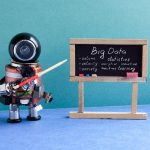In 1965, the American engineer Gordon Moore predicted that the number of transistors per silicon chip would double every year. This observation, called Moore's law, underpinned long-term planning strategies and shaped our ideas of the future for several decades. Since 2012 the pace of advancement was declining steadily, and in 2017 Intel stated the era of Moore's law is over … [Read more...] about Is the 4th Industrial Revolution Underway?
Big Data
Learn everything you need to know about big data. Find out how companies are using this revolutionary technology and what it means for your business strategy.
Why Kubernetes Is Great for Data Science
Since it was launched, Kubernetes technology has transformed the way software developers build and deploy applications. The widespread adoption of this technology intrigued data scientists, who saw that Kubernetes also provides features to optimize and support the data science workflow. In this post, I'll explain what is Kubernetes and how it can help support data science … [Read more...] about Why Kubernetes Is Great for Data Science
Data Veracity: a New Key to Big Data
In his speech at Web Summit 2018, Yves Bernaert, the Senior Managing Director at Accenture, declared the quest for data veracity that will become increasingly important for making sense of Big Data. In short, Data Science is about to turn from data quantity to data quality. It is true, that data veracity, though always present in Data Science, was outshined by other three big … [Read more...] about Data Veracity: a New Key to Big Data
How Big Data Can Help With Crop Yield
Agriculture has long been the backbone of a healthy civilization and with the capabilities technology currently offers, it would be irresponsible to not embrace an opportunity to unite both and maximize our efforts towards the improvement of sustainable farming. One way to achieve innovative solutions is through the collection and evaluation of big data. By harvesting the … [Read more...] about How Big Data Can Help With Crop Yield
Data Ownership Challenges and Controversies: 2019
Technology has rapidly advanced in the past decade, an impossible feat without the use of large quantities of data. But businesses and consumers alike are now talking about who owns this data ” and what it's worth. Companies collect your data daily when you use your smartphone, jump on a hotspot, connect to your car's Bluetooth, operate your smart TV and more. Each new purchase … [Read more...] about Data Ownership Challenges and Controversies: 2019
What is big data?
Big data is a term that refers to the massive amount of digital data created and shared every day. Big data can transform how we live, work, and communicate. It can be used to improve everything from public health and urban planning to business and marketing.
Big data is also changing the way we think about privacy and security. The volume, velocity, and variety of big data present challenges and opportunities for organizations and individuals. Regardless, big data is here to stay, and its impact will only continue to grow in the years to come.
What is big data analytics?
Big data analytics is the process of turning large, complex data sets into actionable insights. Businesses use various analytical tools and techniques, including machine learning and statistical analysis, to do this.
Big data analytics can be used to improve decision-making in areas like marketing, operations, and customer service. It can also be used to identify new business opportunities and optimize existing processes. With the help of big data analysis, businesses can gain a competitive edge by using their data better.
Want to learn more about big data? Datafloq has courses available. Contact us to get started.
When was big data introduced?
The term big data was coined in the 1990s, with some giving credit to John Mashey for popularizing the term. However, the concept of big data has been around for much longer.
Where does big data come from?
In the early days of computing, scientists and businesses began to realize that the amount of data being generated was increasing exponentially. As a result, they began to develop new methods for storing and processing data.
Over time, these methods have become increasingly sophisticated and have played a key role in enabling businesses to make sense of vast amounts of information. Today, big data is used in various industries, from retail to healthcare, and its importance is only likely to grow in the years to come.
What are examples of big data?
One of the most common examples of big data is social media data. With over 2 billion active users, Facebook generates a huge amount of data every day. This includes information on user interactions, posts, and even location data. Analyzing this data can help companies better understand their customers and target their marketing efforts.
Another example of big data is GPS signals. These signals are constantly being generated by devices like cell phones and fitness trackers. When combined with other data sets, GPS signals can be used to provide insights into everything from traffic patterns to human behavior. Finally, weather patterns are another type of big data set. By tracking these patterns over time, scientists can better understand the impact of climate change and develop strategies for mitigating its effects.
How do companies use big data?
Companies use big data in marketing, product development, and customer service. By analyzing large data sets, businesses can identify patterns and trends that would be otherwise difficult to spot. For example, a company might use big data to track customer behavior patterns to improve its marketing efforts.
Alternatively, a company might use big data to improve its products by identifying areas where customers are most likely to experience problems. For instance, big data can be used to improve customer service by finding pain points in the customer journey. Ultimately, big data provides companies with a valuable tool for gaining insights into their business operations.






